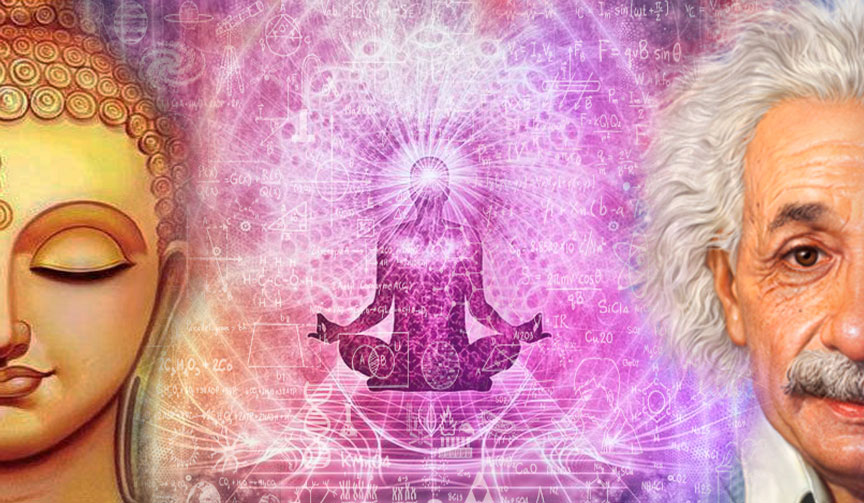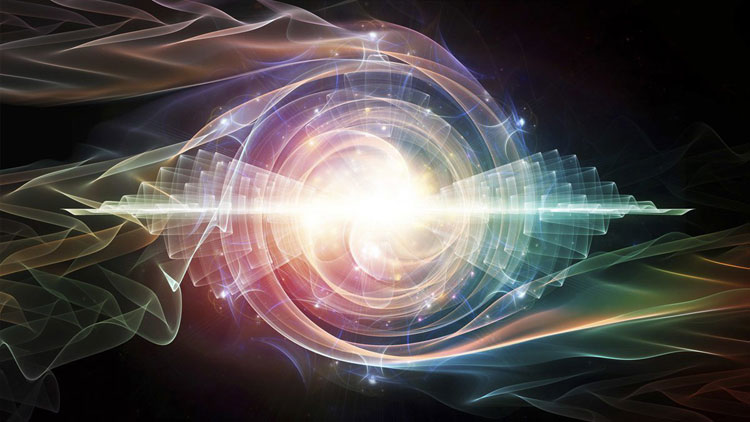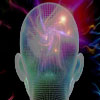Bridging The Gap Between Science And Spirituality
 By Zoe Blarowski
By Zoe Blarowski
The term ‘quantum physics’ may sound like an abstract scientific concept that has no relation to everyday life. But, quantum physics is really the study of life itself, and what makes everything we experience possible. And as we discover more about the true nature of life, this branch of science is starting to find the same principles that many spiritual traditions have taught for millennia.
WHAT IS QUANTUM PHYSICS?
Quantum physics, also known as quantum mechanics, is a fundamental theory in physics that examines the smallest particles and energies discovered in nature. These include atoms and subatomic particles like electrons and photons.
What makes these particles so unique is that they behave very differently than what we normally think of as matter, such as a rock or a tree. Classical physics would only measure, for instance, how fast a rock rolls down a slope. Whereas, the atoms and subatomic particles within that rock can change their speed, position or even color at certain times.
If you look even closer, atoms and other particles in their basic form are only made up of energy. And energy is in constant motion. This is where traditional scientific principles often break down because moving energy can’t easily be measured and categorized as science aims to do. Instead, we’re left with an amazing new world of possibilities that start to explain nature on a deeper level, which has traditionally been the realm of spirituality.
WHERE QUANTUM PHYSICS AND SPIRITUALITY MEET
Many religious leaders and scientists have recognized the interconnectedness of quantum physics and spirituality. The Dalai Lama has even stated that reconciling science and religious philosophies may be essential to the future of our species.
How can this be done? Let’s take a look at what concepts quantum physics and spirituality both agree on.
1. We Are All One
The concept that we all come from one God or one universal energy source is common throughout many spiritual traditions. Taoism calls this universal energy the Tao, which is described as having no characteristics, yet it is not nothingness because it contains all potential for life.
But, in the physical world, we all seem like very separate individuals. How can we all be part of one, unified energy?
One answer for this lies in the center of an atom. If you could look at an atom under a powerful microscope, you would see a small, tornado-like vortex that contained other infinitely small energy vortices called quarks and photons. These vortices are invisible to the human eye, and like all energy, they have no mass or physical structure.
That means if you look closely enough at any person, plant or even an object like a rock, its basic structure is nothing more than a collection of spinning energy vortices. And when you look closer still, physicists believe there is a field of energy that permeates the universe called the Higgs field. This is what lies beneath all matter, and interacting with the Higgs field is what gives atoms and other particles their physical mass.
So, despite our apparent separateness, there appears to be only one energy source from which we all arise. Whether it’s called the Tao or the Higgs field, science and religion both agree that it’s real.
2. Your Thoughts Create Reality
Many Eastern spiritual traditions, such as Hinduism, assert that the world we see is an illusion. Your mind has actually created your reality based on your thoughts and perceptions. Numerous modern theories also support this view, including many self-help books that describe how to create the life you want through the power of thought. This may sound far-fetched, but quantum physics has proven that our thoughts can indeed influence matter.
Science previously believed that matter only contained particles, and light only existed in waves. More recently, quantum physicists have found that light can act like a particle, bending around corners or bouncing off walls. And matter can behave as a wave, such as electrons moving in waves around a neutron.
What’s even more far-out is the discovery that simply observing particles actually changes their behavior. Electrons have been shown to behave as waves. Although, an Israeli study revealed they only do this when no one is watching. The more a beam of electrons was observed, the less they behaved like waves. It was as if the observation “forced” them to behave like particles because that’s what scientists expected them to behave like.
What are your expectations in life? Do you ever make statements like “I’ll never get a good job,” or “I’ll never meet my ideal partner”? And do these thoughts somehow have a way of coming true? This could be quantum physics at work in your life.
Try turning negative thoughts around and expect positive things to happen in your life. There’s a good chance your expectations will brush off onto the subatomic particles in your life to help create just what you imagined.
 Energy of an Atom
Energy of an Atom
3. Time Is an Illusion
Considering that your thoughts create reality, some traditions suggest you also create your experience of time. For instance, many schools of Buddhism teach that the way time seems to flow from past to present to future is only an illusion. Quantum physics now provides a way to prove that time is not as absolute as we often think it is.
It starts with what’s known as quantum entanglement. Scientists have proven certain particles can become entangled so that their physical properties will consistently mirror each other. For example, if one photon is spinning horizontally, its entangled partner will be spinning vertically. Interestingly, it’s also been shown this entanglement has nothing to do with proximity. Particles will still mirror each other when they are vast distances apart.
One study took this principle even further. Researchers entangled two photons that had never coexisted. They became entangled while one was in the “future” and one was in the “past”. Despite their separation through time, the physicists were able to show these two photons mirrored each other even in different timeframes.
In a University of Queensland study, photons were shown to actually travel both backwards and forwards through time. In one case, a photon of light was able to interact with itself in a previous state. In a second experiment, a photon travelled through time to interact with another photon in the future.
It’s still unclear if time is nothing more than an illusion, but these findings certainly show that time functions in different ways than we usually perceive. We now know our thoughts can affect the behavior of matter. It’s possible we can affect time as well. Can you actually change your own past or future? Perhaps only time will tell.
4. Your Actions Come Back to You
Most spiritual teachings echo the Christian saying “Do unto others as you would have them do unto you”. Or similarly, the karmic principle that what you put into the universe will come back to you. These may sound like simple courtesies, but quantum physics is revealing there may actually be a scientific law behind them.
It turns out that one particle can be in many locations at once. This brain-bending fact has been proven repeatedly in what physicians call the double-slit experiment. Researchers have sent atoms, photons, complex molecules and other single particles through a barrier that has two slits cut into it. Every time, each particle shows evidence of interacting with itself on the other side of the barrier. This shows the particle somehow went through both slits at the same time.
In the world of quantum physics, tiny particles exist in a constant state of flux. This allows them to occupy an infinite number of locations simultaneously, rather than existing in a solid, fixed form like we’re used to in our world.
This has also given rise to the many-worlds theory, which suggests there’s a potentially infinite number of parallel universes that exist in this moment. This also means there’s an infinite number of potential realities where the infinite versions of you have committed every action possible during your infinite lives.
And, like subatomic particles that can be in more than one place at once, you might also have interacted with yourself. So, it’s a good idea to heed the teachings of spiritual traditions throughout the world and always strive to be the best version of yourself. Because, as we’ve learned from quantum physics, you might be watching.
Posted in Science For The New Agewith comments disabled.





